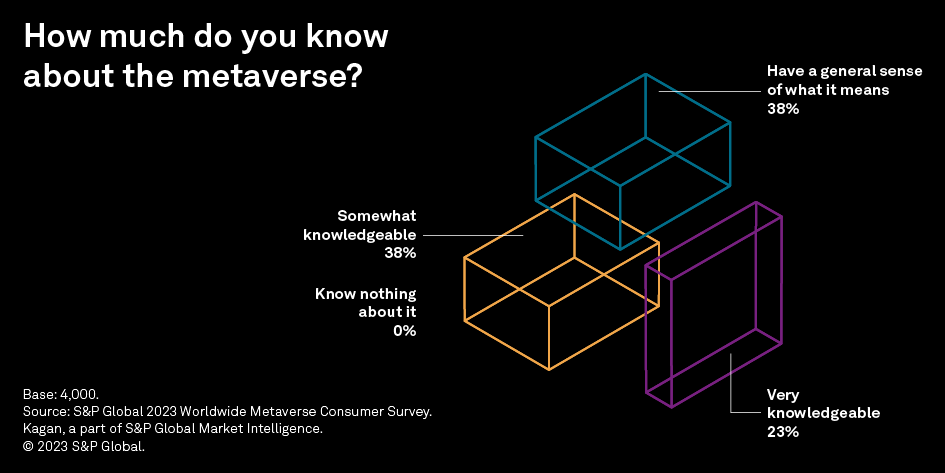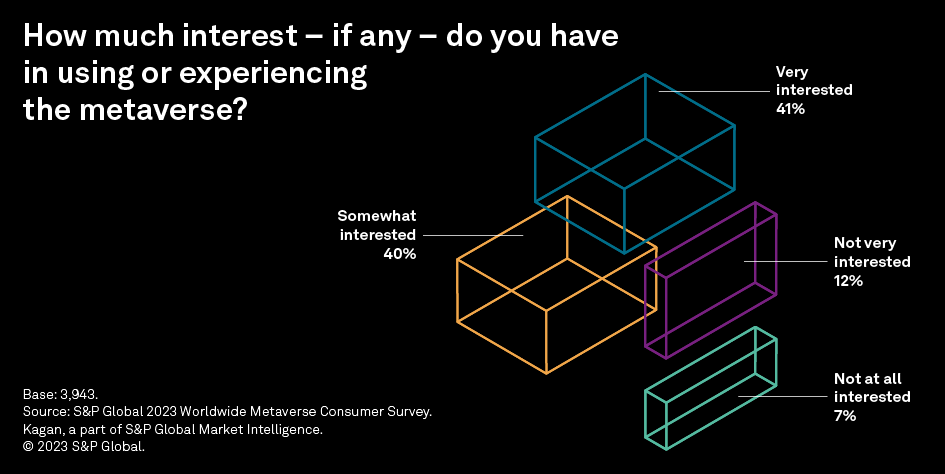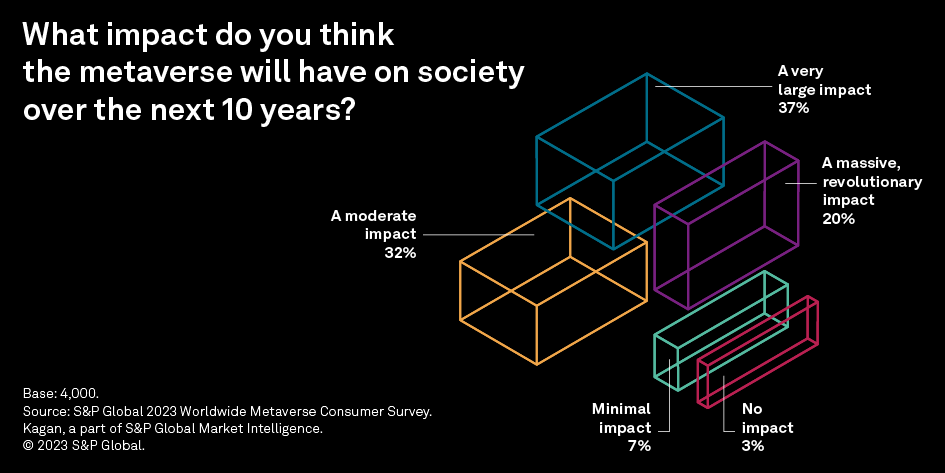More than half of global respondents to a recent S&P Global consumer survey consider themselves somewhat or very knowledgeable of the metaverse and a strong majority have an interest in experiencing it. These results suggest that metaverse stakeholders have already established a potential audience to tap into and that the opportunity to capitalize on the market does exist.
The metaverse, which appeared to be on uneven footing at the outset of 2023, has recently benefited from several tailwinds. Specifically, Apple recently announced it would enter the augmented reality/virtual reality market with its Vision Pro headset, online game platform Roblox has returned to revenue growth, and advancements in generative AI are opening the door to automated content creation for virtual worlds.
Analysis of these survey results indicates that the metaverse is or will soon be primed for advertising, retail and content distribution opportunities inside virtual worlds. This next phase of the internet may still be years away, but some segments of consumers are ready to experience the metaverse right now.
S&P Global defines the metaverse as the long-term vision for the next phase of the internet, which will feature a single, shared, immersive and persistent 3D virtual space where humans and machines interact with one another and with data, enhancing the physical world as much as replacing it.
Note that this web-based survey sampled a range of adults across varying locations, incomes and ages, but respondents were heavily tilted toward millennials in urban settings. This dynamic likely produced an outsized representation of digital natives, or virtual environment “early adopters,” which while not an accurate representation of the overall population still provides valuable insights into a wide range of consumer perceptions.
In practice, the consumer-based metaverse is envisioned as a series of interconnected virtual spaces built for socializing, gaming and shopping. Over the long term, there is potential for these spaces to merge with the real world via augmented reality.
Some of this core experience is already embodied in existing consumer-facing software, such as that available from Roblox Corp., Epic Games Inc.‘s Fortnite Creative, and Meta Horizon World. However, the eventual metaverse would include a higher degree of frictionless interconnection between these experiences as well as a higher degree of user agency. Over the coming weeks, we will publish a series of articles that analyzes the results from our consumer metaverse survey, which polled 4,000 adults in 42 countries around the world during the spring and early summer of 2023. Key areas of focus will include consumer attitudes and behavior around metaverse software and hardware as well as respondents’ key concerns and thoughts on the future.
Even with this in mind, the degree to which survey respondents were familiar with and receptive to the metaverse was striking. Not one survey respondent said they knew nothing about the metaverse, and nearly a quarter said they were “very knowledgeable.”
This may be an unsurprising result considering the media hype that has emerged around the metaverse since Facebook’s rebranding as Meta Platforms Inc. in 2021. Meta CEO Mark Zuckerberg made virtual world building a core piece of the company’s strategic focus to augment, or perhaps justify, the company’s investment in virtual reality hardware.
But even before that, consumers had been prepared for the metaverse in popular fiction and video games. The term “metaverse” is pulled directly from the novel Snow Crash, first published in 1992. Roblox emerged as a platform allowing users to create and move fluidly between worlds in 2006, and Minecraft would follow just a few years later. The novel Ready Player One expounded on the idea of the metaverse in 2011, and Steven Spielberg turned it into a popular movie in 2018.
This long tail of media exposure and the possibilities it depicts are likely going a long way to propel interest in the metaverse. In our survey, 80% of respondents said they were “somewhat” or “very” interested in the metaverse, with the other 20% saying they are “not very” or “not at all” interested.
But this result is notable considering the recent drubbing the metaverse has taken in the press. Meta Horizon Worlds was launched in a relatively bare state in December 2021 and has not done much since then to turn around its less-than-exciting image.
Critiques around emerging metaverse hubs such as Horizon Worlds and even Roblox are that their visuals are too simplistic, there are not enough points of interest, and there are simply not enough things for people to do.
As we will discuss in later reports detailing additional survey results, engagement is robust with those experiences regardless. However, the metaverse may need to make a generational leap forward before it can fully capitalize on the mass market.
More than half of survey respondents believe that the metaverse will have a “revolutionary” or at least “very large” impact on society over the next 10 years. An additional 32% believe that it will have a moderate impact, while 10% believe that it will have minimal or no impact.
More respondents had a high degree of interest in using or experiencing the metaverse than had a high expectation that the metaverse would have a large impact on society. This result suggests that while the promise of the metaverse is driving significant consumer interest, expectations about its long-term impact on society are somewhat less effusive.
Advancements in interface technology, metaverse development tools, fidelity and interconnectivity will be a priority in the coming years. However, it is becoming apparent that metaverse platform developers and environment builders will likely have to become more adept at embracing new business models.
Advertising and e-commerce are two massive revenue opportunities that those involved in metaverse ecosystem development will have to embrace if it is to become as omnipresent as the web is today. So far, the metaverse experiences that have grown from gaming have yet to adapt convincingly to either.
Without those advertising e-commerce revenue streams, the metaverse will likely remain an extension of the online gaming market rather than becoming anything resembling the next iteration of the web.
This article was published by S&P Global Market Intelligence and not by S&P Global Ratings, which is a separately managed division of S&P Global.
Credit: Source link





